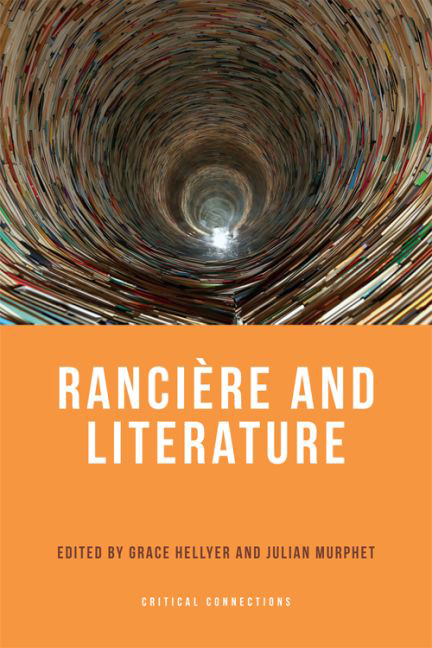Book contents
- Frontmatter
- Contents
- Acknowledgements
- Notes on Contributors
- Introduction: Rancière and Literature
- SECTION I Coordinates
- SECTION II Realisms
- 6 The Novelist and Her Poor: Nineteenth-Century Character Dynamics
- 7 ‘Broiled in Hell-fire’: Melville, Rancière and the Heresy of Literarity
- 8 Why Maggie Tulliver Had To Be Killed
- 9 The Meaning in the Detail: Literature and the Detritus of the Nineteenth Century in Jacques Rancière and Walter Benjamin
- SECTION III Contemporaneities
- Index
6 - The Novelist and Her Poor: Nineteenth-Century Character Dynamics
from SECTION II - Realisms
Published online by Cambridge University Press: 15 September 2017
- Frontmatter
- Contents
- Acknowledgements
- Notes on Contributors
- Introduction: Rancière and Literature
- SECTION I Coordinates
- SECTION II Realisms
- 6 The Novelist and Her Poor: Nineteenth-Century Character Dynamics
- 7 ‘Broiled in Hell-fire’: Melville, Rancière and the Heresy of Literarity
- 8 Why Maggie Tulliver Had To Be Killed
- 9 The Meaning in the Detail: Literature and the Detritus of the Nineteenth Century in Jacques Rancière and Walter Benjamin
- SECTION III Contemporaneities
- Index
Summary
Elizabeth Gaskell's 1848 novel Mary Barton is full of poetry, but not where the characters can see it. In the epigraphs and footnotes, for the eyes of readers and narrators only, Samuel Coleridge's ‘Christabel’, John Keats's ‘Hyperion’, Edmund Spenser's The Faerie Queene, Dante's The Divine Comedy, John Donne's ‘Second Anniversary’, Robert Burns's ‘Mary Morison’, Walter Savage Landor's ‘The Mermaid’, Tennyson's ‘Mariana’ (which Gaskell misquotes), bits of Geoffrey Chaucer, John Wycliffe, Ben Jonson, Shakespeare and Thomas Carlyle – all mark out the common culture of the readers of this novel, who are not the same as its characters. The epigraphs were added at the suggestion of Gaskell's publisher, Chapman and Hall, for reasons I will discuss below, and the footnotes were added by her husband, Peter Gaskell, and are ‘translations’ of Manchester dialect that often use medieval and early modern literary sources as examples.
The reading that the characters do, or the textual matter that they hear (literacy being a complicated matter), is represented in a handful of documents, including a Manchester song, ‘The Oldham Weaver’, which the seamstress Margaret Jennings sings and the lyrics of which the narrator transcribes for us – except that she leaves out one problematic stanza in which conflict emerges between weaver and master, thus softening the song's ‘note of rebelliousness’; the People's Charter, which Parliament refuses to read but of which the Chartist characters in the novel have probably read, or heard, a significant part; ‘an old copy of the Northern Star’, a Chartist newspaper the narrator tells us John Barton has ‘borrowed from a public-house’, a typical source of periodicals for the poor in the period; the Bible; and a poem by Samuel Bamford, ‘the working class radical’, that Job Legh, Margaret's autodidactic grandfather, recites and that Mary Barton then copies down, at her father's request. The apparent homogeneity of this list – all of the reading by the poor seems to concern the poor – is deceptive and relies on the middle-class reader, from 1848 to the present, having very little idea of the complexity of Chartism as a political movement and of the variety and cosmopolitanism of a radical paper like the Northern Star.
- Type
- Chapter
- Information
- Rancière and Literature , pp. 125 - 142Publisher: Edinburgh University PressPrint publication year: 2016



